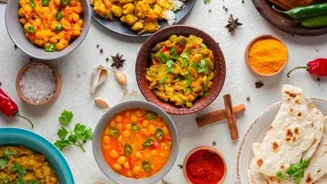Unveiling the Intricate Connection Between Indian Food and Tradition. Delve into the cultural essence and spiritual significance. Read more to explore
India, a land of vibrant colours, diverse cultures,
and rich traditions, boasts a culinary heritage as multifaceted as the country itself.
Indian food is more than just a means of sustenance; it's an integral part of the nation's cultural identity, deeply intertwined with age-old traditions, religious beliefs, and social customs.
Every dish tells a story, reflecting the unique history and geographical influences of its region of origin. From the simple yet nourishing lentil-based dishes of South India to the elaborate vegetarian feasts of Rajasthan, Indian cuisine is a testament to the country's incredible diversity.
This intricate connection between food and tradition is what makes Indian cuisine so special and deeply meaningful. Understanding this link provides a fascinating glimpse into the heart and soul of India.
Food in India reflects religious beliefs, shared through festivals and daily rituals
Food in India is intimately linked to religious practices. Many festivals have specific dishes associated with them, prepared as offerings to deities and shared among families and communities. During Diwali, sweets like ladoos and barfis are made to celebrate the victory of good over evil.

The act of offering food, known as "Prasad," is a common practice in temples and homes, signifying gratitude and devotion. Fasting, another significant religious practice, often involves abstaining from certain foods or eating only specific items.
These practices demonstrate the deep spiritual significance of food in Indian culture, where it is seen not just as nourishment but as a way to connect with the divine. The traditions are passed down from generations. Certain food items which are prepared at home, are believed to be holy.
Ayurvedic principles shape Indian food habits for health benefits
Ayurveda, the ancient Indian system of medicine, plays a crucial role in shaping Indian food habits. Ayurvedic principles emphasize the importance of balancing the "doshas" (Vata, Pitta, and Kapha) through diet.
Food is classified based on its qualities – whether it's heating or cooling, heavy or light – and individuals are encouraged to eat according to their body type and the season. Spices, an essential component of Indian cuisine, are used not only for flavour but also for their medicinal properties.
Turmeric, for instance, is known for its anti-inflammatory benefits, while ginger aids digestion. The Ayurvedic influence on Indian food is evident in the emphasis on fresh, whole ingredients and the mindful consumption of food in accordance with one's needs.
This influence has been carried on and is still followed by many with utmost importance. The food practices are mostly based on health benefits.
Community dining promotes equality and unity in various religions
The concept of community dining, known as "Langar" in Sikhism and commonly practiced in Hindu temples and other religious gatherings, is a powerful tradition that promotes equality and unity. In these settings, food is prepared and served to all, regardless of caste, creed, or social status.
Everyone sits together on the floor and eats the same meal, fostering a sense of belonging and shared humanity. This tradition stems from the belief that food is a gift from God and should be shared with everyone.
The act of serving and eating together breaks down social barriers and reinforces the importance of compassion and service. The tradition of many people sitting together and eating food has been going on for a long time.
Indian cuisine: diverse regional specialties based on ingredients and traditions
Indian cuisine is incredibly diverse, with each region boasting its unique culinary traditions and specialities. South Indian cuisine, for example, is characterized by the use of rice, lentils, and spices like mustard seeds, curry leaves, and coconut.
Dishes like dosas, idlis, and sambar are staples in this region. North Indian cuisine, on the other hand, is known for wheat-based dishes, rich gravies, and the use of dairy products. One can often observe the difference of food preparations across the geographical borders.
The food habits of people differ from place to place.
Indian culture values vegetarianism for health and compassion, rooted in ahimsa principles
The tradition of vegetarianism is deeply rooted in Indian culture, particularly among Hindus and Jains. Vegetarianism is often associated with the principles of non-violence (ahimsa) and compassion for all living beings.
Many Indian families follow strict vegetarian diets, abstaining from meat, fish, and eggs. The emphasis on plant-based foods has led to the development of a vast array of delicious and nutritious vegetarian dishes.
Lentils, vegetables, fruits, and dairy products form the foundation of the Indian vegetarian diet, providing a balanced and wholesome source of nourishment. The tradition of vegetarianism has been followed for years. Many believe in healthy eating with plant based food.
AI Generated Content. Glance/InMobi shall have no liability for the content










